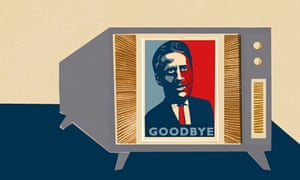“No one’s interested in my bullshit tonight,” Jon Stewart said on his show on Tuesday night. When his special guest arrived and the audience cheered, Stewart acted as though the cheers were in some way unusual and all for the guest – and considering that guest was Barack Obama, that, in any other circumstances, would be a reasonable assumption.
But in fact, the cheers were not significantly greater than they are every night at the beginning of The Daily Show when the lights come up and the audience sees Stewart doing his usual doodling on the legal pad on his desk. People are always interested in Stewart’s bullshit. Obama himself acknowledged as much: “I’m going to issue an executive order: Jon Stewart cannot leave the show,” he said as an opener, and the audience cheered again – partly for the speaker, sure, but mainly because of what the speaker said. Obama is no stranger to talkshows, but it’s hard to imagine him suggesting that even the national-treasure-blah-blah David Letterman should have been obligated to stay on air by law.
Stewart has just commenced his final run of shows before, executive order notwithstanding, ending his 16-year stint of hosting The Daily Show on 6 August. I could pretend to approach this topic with dry objectivity, but the truth is that I am devastated at the thought of life, and especially news, PS (Post Stewart). I am the cliched fan, both in terms of demographic (liberal Jewish New Yorker – or, to use Sarah Palin’s handy shorthand, which I now employ as my email signature, an east coast elite) and loyalty.
The show’s format has never been perfect – Stewart long ago stopped pretending he prepared for 90% of the interviews, posing the question why he bothered keeping them on the show – but the quality never dipped. I originally got Sky TV (proprietor R Murdoch) purely so I could watch The Daily Show in the UK – that’s right, in order to learn how to stick it to the man, I had to give money to that man; I think Stewart would enjoy the irony.
I am so law abiding I consider driving bang on the speed limit a bit risque. But when those muppets at Comedy Central UK took The Daily Show off the air in May (presumably to make space for those essential reruns of Friends and Two and a Half Men) I got a friend to teach me how to wire up my laptop so I could watch The Daily Show here. If I am hauled off to Pentonville, as I am pretty sure on a nightly basis that I will be, I’ll consider it a price worth paying, though I would ask the judge to give me a reprieve until 7 August, for obvious reasons. Maybe my impeccable driving record will finally come in handy here.
In terms of viewer size, The Daily Show remains a mere guppy. And yet there is no US or UK TV host who comes even close to having the cultural impact Jon Stewart had for liberal audiences. Now that an American talkshow’s power is measured by the number of viral music videos it inspires, Stewart’s defiantly unchanging format of mocking the news, dance-free, looks sweetly old-fashioned – and yet his is the one that has had, and will continue to have, the greatest impact on political satire – because he genuinely cares about what he is saying.
This, I’ve finally realised, is why The Daily Show still works while other similarly rigid but far lazier and more cowardly shows just look like the walking dead. It is, for example, an indictment of the state of TV political satire in Britain that no UK broadcaster has managed to come up with anything even a hundredth as good as The Daily Show, despite repeated attempts. Where America has The Daily Show, Britain has Have I Got News for You, which feels like it is being kept in coma-like survival by desperate if utterly unnecessary defibrillation.
American TV hosts are not known for maintaining a sense of perspective. Conan O’Brien’s fury at being removed as host from The Tonight Show, despite a $45m payoff to him and his staff, is still discussed in the US as though it was a cultural event. When the news anchor Brian Williams was caught telling tall tales, pants on fire, earlier this year, the “scandal” was depicted as a moment of soul-searching for the American media. Yet none of these people have affected news events the way Stewart has. He undoubtedly raised the public profile of the now acclaimed liberal senator Elizabeth Warren (despite Obama’s respect for Stewart, Stewart is definitely to the president’s left), and is widely credited with helping, through his advocacy, to push through the 2010 bill pledging federal funds for the healthcare of 9/11 emergency workers.
He is cited as an inspiration to comedians around the world, from Bassem Youssef in Egypt to Trevor Noah in South Africa, who will – Lord help him – attempt to fill Stewart’s Daily Show seat. Not even his enemies in the US, from Fox News to Rush Limbaugh – darling of the talk radio right – can pretend that Stewart doesn’t matter. In fact, the only person who does is Stewart himself, always the first with the self-deflating joke. It is this lack of ego that has let Stewart maintain a clear view of the real issues, a skill Brian Williams et al long ago lost.
Stewart’s success is partly a statement of the failure of American TV news, which is now so shamelessly partisan it is pretty much unwatchable. Stewart, in contrast, has always spiked the left as swiftly as he has the right. When I interviewed him earlier this year, I asked how it felt when he laughed in Obama’s face during their infamous 2010 interview and the president admitted a fairer 2008 campaign slogan would have been “Yes We Can but …”. Stewart replied: “It was heartbreaking. That’s what the gig is.”
Being a journalist is heartbreaking. Pretty much every interview I’ve ever done with someone I admire has been a disappointment because heroes rarely translate well from my ridiculously inflated fantasy to reality. It turns out that TV and movie screens lie. But Stewart was one of the very few exceptions to this rule. He was as grounded, funny, serious and smart as even I hoped, far more interested in the thoughts of others than the sound of his voice, even though it was his voice I wanted to hear. What I saw onscreen was what I got, which is what makes his departure from nightly TV feel even more of a loss. Heartbreaking, even.


View all comments >
comments
Sign in or create your Guardian account to join the discussion.
This discussion is closed for comments.
We’re doing some maintenance right now. You can still read comments, but please come back later to add your own.
Commenting has been disabled for this account (why?)